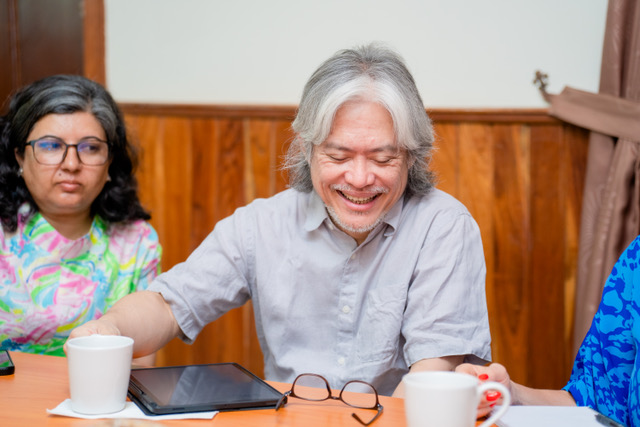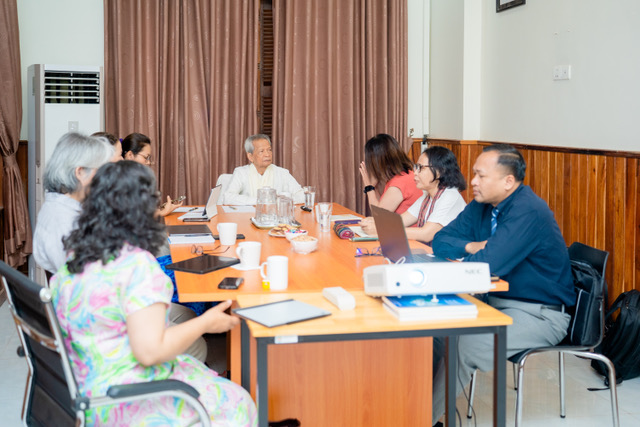ACTS PHD PROGRAMME
The PhD programme was developed for peace practitioners and scholars to question existing knowledge and reflect on practice in the field and strengthen the region’s unique response to the need for conflict transformation work. The programme is based on a practitioner-scholar model and an intervention to build peace. More specifically, this programme has been created to elevate Asian peace practitioners perspectives in theory and practice to enhance capabilities through initiative and reflective study.
The ACTS PhD Programme uses a four-year hybrid distance-residential model. Based at the Center for Peace Conflict Studies and accredited through Pannasatra University, the programme will provide a unique combination of academic rigor and analysis of real-world experience.
For more information on the ACTS PhD Programme, please email the programme at: [email protected]



PhD APPLICATION REQUIREMENTS
Application to the ACTS PhD Programme is a two-stage process. First, students must submit the following:
- A copy of their Master’s degree.
- A copy of their Master’s degree transcript.
- A copy of their resume/CV.
- A personal statement describing in a maximum of 800 words their reasons for wishing to undertake the ACTS PhD Programme and their relevant experience.
- A TOEFL score of at least 550 or IELTS score of at least 6.0, taken within the last 2 years.
- A brief but clear statement indicating the resources they have to effectively communicate online during their non-residential time in the programme (i.e., do they routinely have access to a computer and the internet; if not, how time consuming would it be to get such access, etc.).
- A copy of their passport
- ID photo, 4cm x 6cm
The second stage of the admissions process for students assessed as viable candidates for the programme requires additional information to be provided, including:
- A statement from their employer that they will be able to attend all the residential seminars [to be announced]:
- Three references from individuals familiar with their academic skills and achievements and/or with their work as peace practitioners. Such individuals may be past professors, past or current supervisors or colleagues, etc. but should not be those who have worked or now work for the applicant. Candidates must supply the email addresses of these references, as well as the name of the organization where they work and their position title. Forms for the reference letters will be sent directly by email to references and returned directly by their author rather than through the applicant. References will be asked to attest that the candidate has not read their recommendation.
- A copy of their Master’s degree thesis, if they wrote a thesis for that degree.
- A 1000-2000 word document outlining their current thoughts on the research they plan on conducting during their PhD studies.
- An interview (via Skype if necessary).
- All second-stage applicants must meet any additional PUC requirements. Please check: http://www.puc.edu.kh/index.php/admissions/graduate-programs
Submit documents to [email protected]. All candidates who have successfully passed into the second stage of the application process will also be presented to PUC for their approval of the candidate.
PhD APPLICATION REQUIREMENTS
Application to the ACTS PhD Programme is a two-stage process. First, students must submit the following:
- A copy of their Master’s degree.
- A copy of their Master’s degree transcript.
- A copy of their resume/CV.
- A personal statement describing in a maximum of 800 words their reasons for wishing to undertake the ACTS PhD Programme and their relevant experience.
- A TOEFL score of at least 550 or IELTS score of at least 6.0, taken within the last 2 years.
- A brief but clear statement indicating the resources they have to effectively communicate online during their non-residential time in the programme (i.e., do they routinely have access to a computer and the internet; if not, how time consuming would it be to get such access, etc.).
- A copy of their passport
- ID photo, 4cm x 6cm
The second stage of the admissions process for students assessed as viable candidates for the programme requires additional information to be provided, including:
- A statement from their employer that they will be able to attend all the residential seminars [to be announced]:
- Three references from individuals familiar with their academic skills and achievements and/or with their work as peace practitioners. Such individuals may be past professors, past or current supervisors or colleagues, etc. but should not be those who have worked or now work for the applicant. Candidates must supply the email addresses of these references, as well as the name of the organization where they work and their position title. Forms for the reference letters will be sent directly by email to references and returned directly by their author rather than through the applicant. References will be asked to attest that the candidate has not read their recommendation.
- A copy of their Master’s degree thesis, if they wrote a thesis for that degree.
- A 1000-2000 word document outlining their current thoughts on the research they plan on conducting during their PhD studies.
- An interview (via Skype if necessary).
- All second-stage applicants must meet any additional PUC requirements. Please check: http://www.puc.edu.kh/index.php/admissions/graduate-programs
Submit documents to [email protected]. All candidates who have successfully passed into the second stage of the application process will also be presented to PUC for their approval of the candidate.

ADMISSION PROCESS
- At least five years of work experience in conflict transformation or related fields
- Support of employer or someone connected with the proposed area of work and action research
- Access to a reliable and stable internet connection
- Fluency in English (required to pass IELTS score 6.0 or TOEFL of 550)
- Undergraduate degree and high school degree essential
- Living and working within boundaries of the Asia-Pacific region
- Over 25 years of age
- Willingness to participate in a cross-cultural and interfaith learning environment and commitment to peace and justice values
ADMISSION PROCESS
- At least five years of work experience in conflict transformation or related fields
- Support of employer or someone connected with the proposed area of work and action research
- Access to a reliable and stable internet connection
- Fluency in English (required to pass IELTS score 6.0 or TOEFL of 550)
- Undergraduate degree and high school degree essential
- Living and working within boundaries of the Asia-Pacific region
- Over 25 years of age
- Willingness to participate in a cross-cultural and interfaith learning environment and commitment to peace and justice values
